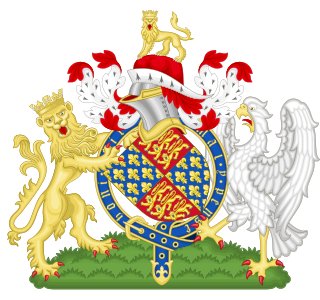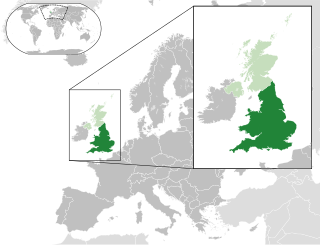Inquests in England and Wales are held into sudden and unexplained deaths and also into the circumstances of discovery of a certain class of valuable artefacts known as "treasure trove". In England and Wales, inquests are the responsibility of a coroner, who operates under the jurisdiction of the Coroners and Justice Act 2009.
A coroner may conduct or order an inquest into the manner or cause of death, and investigate or confirm the identity of an unknown person who has been found dead within the coroner's jurisdiction.
Criminal libel is a legal term, of English origin, which may be used with one of two distinct meanings, in those common law jurisdictions where it is still used.
Misprision of treason is an offence found in many common law jurisdictions around the world, having been inherited from English law. It is committed by someone who knows a treason is being or is about to be committed but does not report it to a proper authority.
Felo de se, Latin for "felon of himself", is an archaic legal term that denotes an illegal act of suicide. Early English common law considered suicide a crime and a person found guilty of it, even though dead, was subject to punishments including forfeiture of property to the monarch and being given a shameful burial. Beginning in the seventeenth century law and custom gradually changed to consider a person who committed suicide to be temporarily insane at the time and conviction and punishment were gradually phased out. The term and punishments could also apply to a person killed while committing a felony.
Contempt of the Sovereign was an ancient doctrine in English law dating from medieval times, and now obsolete. It referred to the notion that if somebody disobeyed an Act of Parliament, but the Act did not say what the penalty was or how the Act was to be enforced, then that person was guilty of a criminal offence under common law. This doctrine was based on the idea that an Act of Parliament was an expression of the Sovereign's will, enacted with the "advice and consent" of Parliament. In modern legislation and jurisprudence it has become the rule that contravening a statute is not a crime unless the statute expressly says so in clear terms, and so the doctrine has long since lapsed. However the law does still exist, and the last time it was used was in 1840.

The Coroner's Court of South Australia is a court which has exclusive jurisdiction over the remains of a person and the power to make findings in respect of the cause of death of a person or fire in South Australia, a state of Australia.
R v Dytham [1979] Q.B. 722 is an English criminal law case dealing with liability for omissions. The court upheld the common law mantra that if there is a duty to act, then failure to do so is an offence.
An inquest is a judicial inquiry in common law jurisdictions, particularly one held to determine the cause of a person's death. Conducted by a judge, jury, or government official, an inquest may or may not require an autopsy carried out by a coroner or medical examiner. Generally, inquests are conducted only when deaths are sudden or unexplained. An inquest may be called at the behest of a coroner, judge, prosecutor, or, in some jurisdictions, upon a formal request from the public. A coroner's jury may be convened to assist in this type of proceeding. Inquest can also mean such a jury and the result of such an investigation. In general usage, inquest is also used to mean any investigation or inquiry.
The publication of an obscene libel was an offence under the common law of England. Prior to the abolition by section 1 of the Criminal Law Act 1967 of the distinction between felony and misdemeanour, it was regarded as a misdemeanour. It has been abolished in England and Wales and Northern Ireland.

The Coroners and Justice Act 2009 is an Act of the Parliament of the United Kingdom. It changed the law on coroners and criminal justice in England and Wales.

The Libel Act 1843, commonly known as Lord Campbell's Libel Act, was an Act of the Parliament of the United Kingdom. It enacted several important codifications of and modifications to the common law tort of libel.
Refusing to assist a constable is an offence under the common law of England and Wales. The offence is committed if a person refuses, without lawful excuse, to assist a constable who sees a breach of the peace committed or who is assaulted or obstructed when making an arrest, and who, where there is reasonable necessity to do so, calls upon that person to assist him. As a common law offence, it is punishable with an unlimited fine and imprisonment, although it is very rarely prosecuted.
Outraging public decency is a common law offence in England and Wales and Hong Kong. It is punishable by unlimited imprisonment and/or an unlimited fine.

The Forcible Entry Act 1381 was an Act of the Parliament of the Kingdom of England. It created a statutory offence of forcible entry which superseded the common law offence.
English law did not originally make a distinction between criminal and civil proceedings.
Personation of a juror is a common law offence in England and Wales, where a person impersonates a juror in a civil or criminal trial. As a common law offence it is punishable by unlimited imprisonment and/or an unlimited fine. Personation of a juror also constitutes a contempt of court.
Refusal to serve in a public office is an offence under the common law of England and Wales. The offence is currently regarded as obsolete, and it may extend only to the appointment of high sheriffs. As a common law offence, it is tried on indictment and can be punished by an unlimited fine and/or period of imprisonment.
Athelstan Braxton Hicks was a Coroner in London and Surrey for two decades at the end of the 19th century. He was given the nickname "The Children's Coroner" for his conscientiousness in investigating the suspicious deaths of children, and especially Baby farming and the dangers of child life insurance. He would later publish a study on infanticide.




